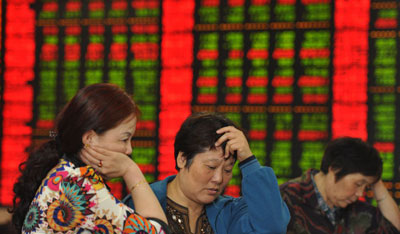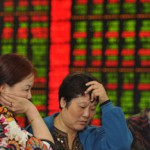Asia Pacific stock markets continue slide as Chinese inflation weakens

Investors have taken fright at the prospect that the US Fed could raise interest rates at the point when China is experiencing persistently weak demand
Stock markets in Asia Pacific have continued to slide as the spectre of higher borrowing costs in the United States and further signs of weakness in China prompted investors to trim their exposure to riskier assets.
The recent rally that followed the market selloff in July and August has petered out as poor Chinese inflation figures on Tuesday pointed to persistent weak demand in the world’s second biggest economy.
Consumer prices in China rose just 1.3% in the year to October, data released by the National Bureau of Statistics showed – the lowest since May and down sharply from 1.6% in September. It was also well below market expectations of 1.5%.
The broad MSCI index of Asia-Pacific shares outside Japan fell on Tuesday, with stocks down in Shanghai by 0.42% and South Korea’s Kospi dropping 1.5%.
In Australia the ASX/S&P200 was having another tough day and was down more than 1% at 2.30pm as investors dumped financial stocks. Shares rallied later in the afternoon to close at 5,099 points, a fall of 0.4%.
In Japan, the Nikkei fell 0.6% from Monday’s 10-week high in early trading before moving into positive territory later in the day.
“After share prices recovered quite a lot (last month), their rally is coming to a halt for now as markets are trying to price in a Fed rate hike in December,” said Takeru Ogihara, chief strategist at Mizuho Trust Securities in Tokyo.
The OECD said in a report that global trade flows have fallen dangerously close to levels usually associated with a global recession, although steps taken by China and others should ensure a pick-up in 2016.
On the other hand, surprisingly strong US jobs data released on Friday has dramatically changed investors’ perception on the Federal Reserve’s monetary policy track, with markets pricing in more than a 70% chance of a rate hike next month.
The stronger US dollar piled more pressure on commodity prices on Tuesday.
Copper fell to a six-week low of $4,940 per tonne, hit also by concerns about demand from China. Brent crude traded at $47.32 a barrel, having slipped more than 7% from last week’s high.
The slump in prices is contributing to China’s deflationary pressure and comes amid growing doubts in global markets about China’s commitment to see through comprehensive financial reforms and prepare the country consumer-led economic growth.
However, on Tuesday the country’s central bank chief mapped out a series of reforms over the next five years to help the yuan become an international currency by 2020.
The policy changes would include improving central bank communications and guiding market expectations to enhance monetary policy, Zhou Xiaochuan wrote on the Caixin magazine’s website. Beijing would also strengthen supervision of its financial system to prevent “systemic risk”.
Source: TheGuardian – Asia Pacific stock markets continue slide as Chinese inflation weakens




























